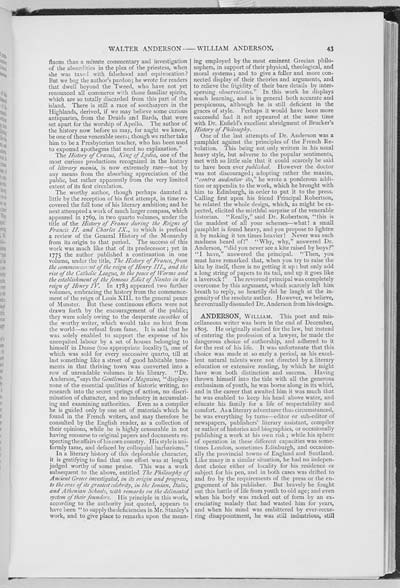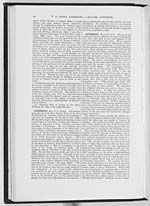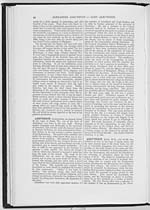43
fluous than a minute commentary and investigation
of the absurdities in the plea of the priestess, when
she was taxed with falsehood and equivocation?
But we beg the author's pardon; he wrote for readers
that dwell beyond the Tweed, who have not yet
renounced all commerce with those familiar spirits,
which are so totally discarded from this part of the
island. There is still a race of soothsayers in the
Highlands, derived, if we may believe some curious
antiquaries, from the Druids and Bards, that were
set apart for the worship of Apollo. The author of
the history now before us may, for aught we know,
be one of these venerable seers; though we rather take
him to be a Presbyterian teacher, who has been used
to expound apothegms that need no explanation."
The History of Croesus, King of Lydia, one of the
most curious productions recognized in the history
of literary mania, is now extremely rare�not by
any means from the absorbing appreciation of the
public, but rather apparently from the very limited
extent of its first circulation.
The. worthy author, though perhaps daunted a
little by the reception of his first attempt, in time re-
covered the full tone of his literary ambition; and he
next attempted a work of much larger compass, which
appeared in 1769, in two quarto volumes, under the
title of the History of France diiring the Reigns of
Francis II. and Charles IX., to which is prefixed
a review of the General History of the Monarchy
from its origin to that period. The success of this
work was much like that of its predecessor; yet in
1775 the author published a continuation in one
volume, under the title, The History of France, from
the commencement of the reign of Henry III., and the
rise of the Catholic League, to the peace of Worms and
the establishment of the famous Edict of Nantes in the
reign of Henry IV. In 1783 appeared two further
volumes, embracing the history from the commence-
ment of the reign of Louis XIII. to the general peace
of Munster. But these continuous efforts were not
drawn forth by the encouragement of the public;
they were solely owing to the desperate cacoethes of
the worthy writer, which would take no hint from
the world�no refusal from fame. It is said that he
was solely enabled to support the expense of his
unrequited labour by a set of houses belonging to
himself in Dunse (too appropriate locality!), one of
which was sold for every successive quarto, till at
last something like a street of good habitable tene-
ments in that thriving town was converted into a
row of unreadable volumes in his library. "Dr.
Anderson, "says the Gentleman's Magazine, "displays
none of the essential qualities of historic writing, no
research into the secret springs of action, no discri-
mination of character, and no industry in accumulat-
ing and examining authorities. Even as a compiler
he is guided only by one set of materials which he
found in the French writers, and may therefore be
consulted by the English reader, as a collection of
their opinions, while he is highly censurable in not
having recourse to original papers and documents re-
specting the affairs of his own country. His style is uni-
formly tame, and defaced by colloquial barbarisms."
In a literary history of this deplorable character,
it is gratifying to find that one effort was at length
judged worthy of some praise. This was a work
subsequent to the above, entitled The Philosophy of
Ancient Greece investigated, in its origin and progress,
to the eras of its greatest celebrity, in the Ionian, Italic,
and Athenian Schools, with remarks on the delineated
system of their founders. His principle in this work,
according to the authority just quoted, appears to
have been "to supply the deficiencies in Mr. Stanley's
work, and to give place to remarks upon the mean-
ing employed by the most eminent Grecian philo-
sophers, in support of their physical, theological, and
moral systems; and to give a fuller and more con-
nected display of their theories and arguments, and,
to relieve the frigidity of their bare details by inter-
spersing observations." In this work he displays
much learning, and is in general both accurate and
perspicuous, although he is still deficient in the
graces of style. Perhaps it would have been more
successful had it not appeared at the same time
with Dr. Enfield's excellent abridgment of Brucker's
History of Philosophy.
One of the last attempts of Dr. Anderson was a
pamphlet against the principles of the French Re-
volution. This being not only written in his usual
heavy style, but adverse to the popular sentiments,
met with so little sale that it could scarcely be said
to have been ever published. However the doctor
was not discouraged; adopting rather the maxim,
"contra audentior ito," he wrote a ponderous addi-
tion or appendix to the work, which he brought with
him to Edinburgh, in order to put it to the press.
Calling first upon his friend Principal Robertson,
he related the whole design, which, as might be ex-
pected, elicited the mirthful surprise of the venerable
historian. "Really," said Dr. Robertson, "this is
the maddest of all your schemes�what! a small
pamphlet is found heavy, and you propose to lighten
it by making it ten times heavier! Never was such
madness heard of!" "Why, why," answered Dr.
Anderson, "did you never see a kite raised by boys?"
"I have," answered the principal. "Then, you
must have remarked that, when you try to raise the
kite by itself, there is no getting it up : but only add
a long string of papers to its tail, and up it goes like
a laverock !" The reverend principal was completely
overcome by this argument, which scarcely left him
breath to reply, so heartily did he laugh at the in-
genuity of the resolute author. However, we believe,
he eventually dissuaded Dr. Anderson from his design.
ANDERSON, WILLIAM. This poet and mis-
cellaneous writer was born in the end of December,
1805. He originally studied for the law, but instead
of entering the profession of a lawyer, he made the
dangerous choice of authorship, and adhered to it
for the rest of his life. It was unfortunate that this
choice was made at so early a period, as his excel-
lent natural talents were not directed by a literary
education or extensive reading, by which he might
have won both distinction and success. Having
thrown himself into the tide with all the generous
enthusiasm of youth, he was borne along in its whirl,
and in the career that awaited him it was much that
he was enabled to keep his head above water, and
educate his family for a life of respectability and
comfort. As a literary adventurer thus circumstanced,
he was everything by turns�editor or sub-editor of
newspapers, publishers' literary assistant, compiler
or author of histories and biographies, or occasionally
publishing a work at his own risk; while his sphere
of operation in these different capacities was some-
times London, sometimes Edinburgh, and occasion-
ally the provincial towns of England and Scotland.
Like many in a similar situation, he had no indepen-
dent choice either of locality for his residence or
subject for his pen, and in both cases was drifted to
and fro by the requirements of the press or the en-
gagement of his publisher. But bravely he fought
out this battle of life from youth to old age; and even
when his body was racked out of form by an ex-
cruciating malady that had wasted him for years,
and when his mind was embittered by ever-recur-
ring disappointment, he was still industrious, still

![]() Universal Viewer |
Universal Viewer | ![]() Mirador |
Large image | Transcription
Mirador |
Large image | Transcription
![]()

